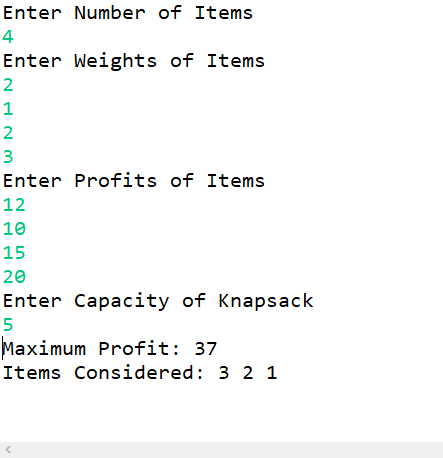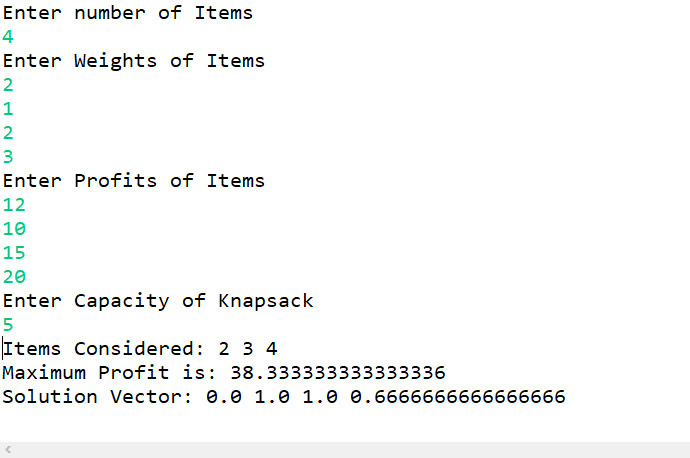×
NOTE!
Click on MENU to Browse between Subjects...
Advertisement
DESIGN AND ANALYSIS OF ALGORITHMS LABORATORY
(Effective from the academic year 2018 -2019)
SEMESTER - IV
Course Code 18CSL47
CIE Marks 40
Number of Contact Hours/Week 0:2:2
SEE Marks 60
Total Number of Lab Contact Hours 36
Exam Hours 03
Advertisement
Experiments 6 A
Implement in Java, the 0/1 Knapsack problem using
(a) Dynamic Programming
method
Advertisement
1 2 3 4 5 6 7 8 9 10 11 12 13 14 15 16 17 18 19 20 21 22 23 24 25 26 27 28 29 30 31 32 33 34 35 36 37 38 39 40 41 42 43 44 45 46 47 48 49 50 51 52 53 54 55 56 57 58 59 60 61 62 63 64 | import java.util.Scanner; class Knapsack { int[] weight, profit; int capacity, n; Knapsack() { //constructor automatically called Scanner scan = new Scanner(System.in); System.out.println("Enter Number of Items"); n = scan.nextInt(); weight = new int[n]; profit = new int[n]; System.out.println("Enter Weights of Items"); for (int i = 0; i < n; i++) { weight[i] = scan.nextInt(); } System.out.println("Enter Profits of Items"); for (int i = 0; i < n; i++) { profit[i] = scan.nextInt(); } System.out.println("Enter Capacity of Knapsack"); capacity = scan.nextInt(); scan.close(); } void fill() { int[][] K = new int[n + 1][capacity + 1]; for (int i = 0; i <= n; i++) { for (int j = 0; j <= capacity; j++) { if (i == 0 || j == 0) { K[i][j] = 0; } else if (j < weight[i - 1]) { K[i][j] = K[i - 1][j]; } else { K[i][j] = Math.max(K[i - 1][j], profit[i - 1] + K[i - 1][j - weight[i - 1]]); } } } System.out.println("Maximum Profit: " + (K[n][capacity])); System.out.print("Items Considered: "); int i = n, j = capacity; while (i > 0 && j > 0) { if (K[i][j] != K[i - 1][j]) { System.out.print(i + " "); j -= weight[i - 1]; } i -= 1; } System.out.println(); } public static void main(String[] args) { Knapsack knapsack = new Knapsack(); knapsack.fill(); } } |

Fig 6 A: Output .
Advertisement
Experiments 6 B
Implement in Java, the 0/1 Knapsack problem using
(b) Greedy method.
Advertisement
1 2 3 4 5 6 7 8 9 10 11 12 13 14 15 16 17 18 19 20 21 22 23 24 25 26 27 28 29 30 31 32 33 34 35 36 37 38 39 40 41 42 43 44 45 46 47 48 49 50 51 52 53 54 55 56 57 58 59 60 61 62 63 64 65 66 67 68 69 70 71 72 73 74 75 76 77 78 79 80 81 82 83 84 85 86 87 88 | import java.util.Scanner; class Knapsack { double[] weight, profit, ratio, solnVector; double capacity; Knapsack() { Scanner scan = new Scanner(System.in); System.out.println("Enter number of Items"); int n = scan.nextInt(); weight = new double[n]; profit = new double[n]; ratio = new double[n]; solnVector = new double[n]; System.out.println("Enter Weights of Items"); for (int i = 0; i < n; i++) { weight[i] = scan.nextDouble(); } System.out.println("Enter Profits of Items"); for (int i = 0; i < n; i++) { profit[i] = scan.nextDouble(); } System.out.println("Enter Capacity of Knapsack"); capacity = scan.nextDouble(); scan.close(); } int getNext() { int index = -1; double highest = 0; for (int i = 0; i < ratio.length; i++) { if (ratio[i] > highest) { highest = ratio[i]; index = i; } } return index; } void fill() { double currentWeight = 0; double currentProfit = 0; for (int i = 0; i < ratio.length; i++) { ratio[i] = profit[i] / weight[i]; } System.out.print("Items Considered: "); while (currentWeight < capacity) { int item = getNext(); if (item == -1) { break; } System.out.print((item + 1) + " "); if (currentWeight + weight[item] <= capacity) { currentWeight += weight[item]; currentProfit += profit[item]; solnVector[item] = 1; ratio[item] = 0; } else { currentProfit += ratio[item] * (capacity - currentWeight); solnVector[item] = (capacity - currentWeight) / weight[item]; break; } } System.out.println(); System.out.println("Maximum Profit is: " + currentProfit); System.out.print("Solution Vector: "); for (int i = 0; i < solnVector.length; i++) { System.out.print(solnVector[i] + " "); } System.out.println(); } public static void main(String[] args) { Knapsack knapsack = new Knapsack(); knapsack.fill(); } } |
Advertisement

Fig 6 B: Output .
×
Note
Please Share the website link with Your Friends and known Students...
-ADMIN
-ADMIN
×
Note
Page Number is specified to navigate between Pages...
T = Text book
QB = Question Bank
AS = Amswer Script
-ADMIN
T = Text book
QB = Question Bank
AS = Amswer Script
-ADMIN
Advertisement

 MENU
MENU

